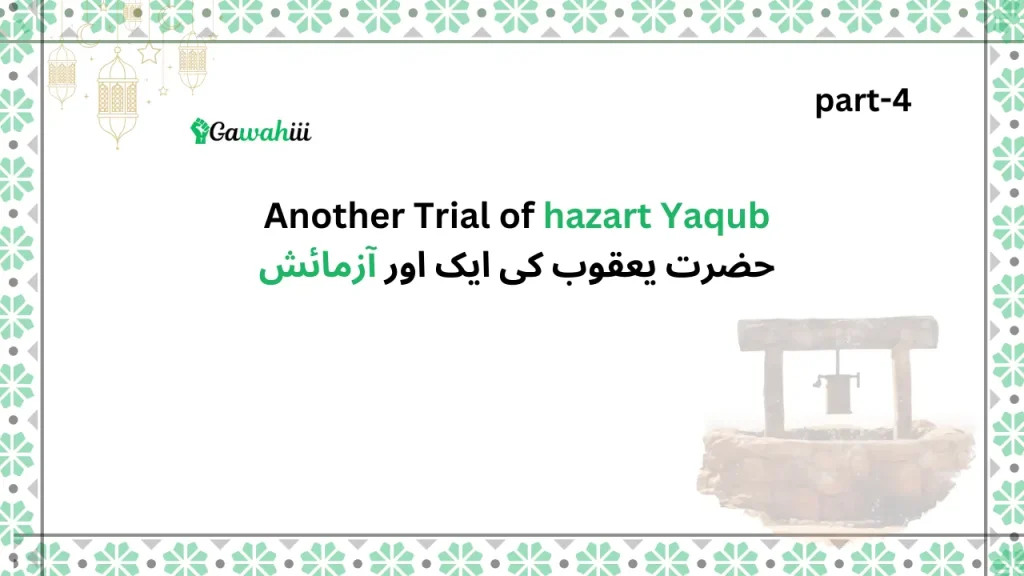
Imam Qurtubi says that Binyamin said to Yusuf, “Don’t return me to them.” Yusuf replied, “You know the grief of Jacob for me. This would increase even more because of you,” but Binyamin insisted. To keep him, Yusuf placed a pot in his brother’s goods, which they used for both scaling and drinking water [17]. When they had walked a little, a voice reached their ears, saying that the scale was stolen! Upon searching, it was found with Binyamin, and thus he was arrested, as their law required that the thief be made a slave. As the Quran describes:
“Thus did We plan for Joseph.” (Surah Yusuf, 12:76)
After spending much effort, when they became disappointed in getting their brother back, they withdrew and consulted one another. The eldest said, “I will not depart from this land until my father gives me permission. Go and inform your father.” When they told their father about the event, his grief for Yusuf increased until his eyes became white, as mentioned in the Quran.
Yaqub’s letter to the Aziz of Egypt
Imam Qurtubi writes that the Angel of Death told Jacob that he had not taken the soul of Yusuf and even pointed towards Egypt, saying to search there. Also, Jacob knew that Yusuf was alive because of the dream. Afterward, Yaqub asked his son to go to Egypt and gave them a letter to Aziz of Egypt. When they arrived in Egypt and spoke to Yusuf about the famine, they discussed their poverty and lack of money and then handed over the letter. Yusuf wept and reminded his brothers, saying, “Do you know what you did to Yusuf?” [18] Imam Baghawi writes that he took off his crown, and they recognized that he was Yusuf, asking, “Are you Yusuf?” He replied, “Yes, and this is my brother.” [19]
The secret was revealed, and Yusuf forgave them all. Then he asked them to bring the entire family to Egypt. Imam Qurtubi writes that Yusuf gave them a shirt that had been passed down to him from Ibrahim, peace be upon him, which he wore when thrown into the fire. When the shirt was thrown over his father’s eyes, his sight was restored. Imam Qurtubi says they were 63 individuals when they set out on their journey to Egypt. [20]
The Reunion of Yusuf and Yaqub after Many Years
Imam Tabari writes, “When Yusuf’s father and brothers reached near Egypt, Aziz of Egypt were informed of their arrival, so he and the kind along with 4 thousand people came outside to welcome Jacob and his sons with very enthusiasm. When one of them approached the other, Jacob was walking, leaning on one of his sons, called Judah. Jacob looked at the horses and the people and said: ‘O Judah, is this the Pharaoh of Egypt?’ He replied: ‘No, this is your son!’ When they got close to each other, Joseph intended to greet him with peace, but he was prevented from doing so, as Jacob had more rights and was of greater virtue. Then Jacob said: ‘Peace be upon you, the one who has taken away my sorrows.’” [21]
Imam Baghawi writes, “Jacob seated his aunt and brothers on the bed, and the greeting of the people in those days was prostration. However, prostration here does not mean placing the foreheads on the ground, but rather bowing and showing humility. Some have said they did place their foreheads on the ground, and this was a way of greeting and showing respect, not an act of worship. This practice was permissible for previous nations, but it has been abrogated in this Shariah (Islamic law).” [22]
This was the dream that came true after years and in the end, Yusuf pray in this manner:
“My Lord, You have given me [something] of sovereignty and taught me of the interpretation of dreams. Creator of the heavens and the earth, You are my protector in this world and the Hereafter. Cause me to die a Muslim and join me with the righteous.”
Lessons
The story of Yusuf carries advice, lessons, and continues. Whoever reads this story, a desire for righteous deeds arises in his heart, and he avoids committing sins. This story gives us the lesson that Allah does not dismiss the good deed of a person, as we see that Yusuf was put through various troubles, but he practiced patience, trusted in Allah, and surrendered to the will of Allah. In turn, he was given the highest status both worldly and in the hereafter. This story also tells us that everything is written and judged beforehand in Loh-e-Mahfooz, which a person can’t change by going against the order of Allah. In this story, we are given a lesson that someone cannot be proud of his/her beauty, which often leads to being ensnared by the net of Iblis and breaking the commandments of the Creator. A person should not forget their limits.
یعقوب کی ایک اور آزمائش
امام قرطبی کہتے ہیں کہ بنیامین نے یوسف سے کہا کہ مجھے ان کے پاس نہ لوٹاؤ۔ یوسف نے جواب دیا، “آپ کو میرے لیے یعقوب کا غم معلوم ہے، یہ آپ کی وجہ سے اور بھی بڑھ جائے گا۔” لیکن بنیامین نے اصرار کیا۔ اسے رکھنے کے لیے یوسف نے اپنے بھائی کے سامان میں ایک برتن رکھا جسے وہ پینے اور پانی پینے کے لیے استعمال کرتے تھے [17]۔ جب وہ تھوڑا سا چلے تو ان کے کانوں میں آواز آئی کہ پیمانہ چوری ہو گیا ہے۔ تلاش کرنے پر، یہ بنیامین کے ساتھ مل گیا، اور اس طرح اسے گرفتار کر لیا گیا، کیونکہ ان کا قانون یہ تھا کہ چور کو غلام بنایا جائے۔ جیسا کہ قرآن بیان کرتا ہے:
اس طرح ہم نے یوسف کے لیے منصوبہ بنایا۔ (سورہ یوسف، 12:76)
بہت کوشش کرنے کے بعد جب وہ اپنے بھائی کو واپس نہ ملنے پر مایوس ہوئے تو پیچھے ہٹ گئے اور آپس میں مشورہ کرنے لگے۔ سب سے بڑے نے کہا کہ جب تک میرے والد مجھے اجازت نہ دیں میں اس ملک سے نہیں جاؤں گا، جا کر اپنے باپ کو اطلاع کر دو۔ جب انہوں نے اپنے والد کو اس واقعہ کے بارے میں بتایا تو یوسف کے لیے ان کا غم بڑھ گیا یہاں تک کہ ان کی آنکھیں سفید ہو گئیں جیسا کہ قرآن میں مذکور ہے۔
یعقوب کا خط عزیز مصر کے نام
امام قرطبی لکھتے ہیں کہ موت کے فرشتے نے یعقوب کو بتایا کہ اس نے یوسف کی روح قبض نہیں کی اور مصر کی طرف اشارہ کرتے ہوئے کہا کہ وہاں تلاش کرو۔ نیز، یعقوب کو معلوم تھا کہ یوسف خواب کی وجہ سے زندہ ہے۔ اس کے بعد یعقوب نے اپنے بیٹے کو مصر جانے کو کہا اور انہیں مصر کے عزیز کو ایک خط دیا۔ جب وہ مصر پہنچے اور یوسف سے قحط کے بارے میں بات کی تو انہوں نے اپنی غربت اور پیسے کی کمی کے بارے میں بات کی اور پھر خط ان کے حوالے کیا۔ یوسف نے روتے ہوئے اپنے بھائیوں کو یاد دلایا اور کہا کہ تم جانتے ہو کہ تم نے یوسف کے ساتھ کیا کیا؟ امام بغوی لکھتے ہیں کہ اس نے اپنا تاج اتار دیا تو انہوں نے پہچان لیا کہ وہ یوسف ہیں، پوچھا کیا تم یوسف ہو؟ اس نے جواب دیا: ہاں، اور یہ میرا بھائی ہے۔ [19]
راز کھل گیا اور یوسف نے ان سب کو معاف کر دیا۔ پھر اس نے ان سے کہا کہ وہ پورے خاندان کو مصر لے آئیں۔ امام قرطبی لکھتے ہیں کہ یوسف نے انہیں ایک قمیص دی جو ابراہیم علیہ السلام کی طرف سے ان کے پاس پہنچی تھی جسے وہ آگ میں ڈالتے وقت پہنتے تھے۔ جب قمیض اس کے والد کی آنکھوں پر ڈالی گئی تو اس کی بینائی بحال ہوگئی۔ امام قرطبی کہتے ہیں کہ جب وہ مصر کے سفر پر روانہ ہوئے تو ان کی تعداد 63 تھی۔ [20]
کئی سالوں کے بعد یوسف اور یعقوب کا دوبارہ ملاپ
امام طبری لکھتے ہیں کہ جب یوسف کے والد اور بھائی مصر کے قریب پہنچے تو عزیز مصر کو ان کی آمد کی اطلاع ملی تو وہ اور اس قسم کے لوگ 4 ہزار افراد کے ساتھ یعقوب اور ان کے بیٹوں کے استقبال کے لیے بڑے جوش و خروش کے ساتھ باہر نکلے، جب ان میں سے ایک دوسرے کے قریب پہنچا تو یعقوب اپنے ایک بیٹے پر ٹیک لگائے پیدل چل رہے تھے، جاکوب نے گھوڑے کی طرف دیکھا اور جاکو نے کہا: یہوداہ، کیا یہ مصر کا فرعون ہے؟’ اس نے جواب دیا: ‘نہیں، یہ تمہارا بیٹا ہے!’ جب وہ ایک دوسرے کے قریب پہنچے تو یوسف نے اسے سلام کرنے کا ارادہ کیا، لیکن اسے ایسا کرنے سے روک دیا گیا، کیونکہ یعقوب کے زیادہ حقوق تھے اور وہ زیادہ فضیلت والے تھے، پھر یعقوب نے کہا: ”سلام ہو آپ پر جس نے میرے غم کو دور کیا”۔
امام بغوی لکھتے ہیں کہ یعقوب علیہ السلام نے اپنی خالہ اور بھائیوں کو بستر پر بٹھایا اور ان دنوں لوگوں کا سلام سجدہ تھا، تاہم یہاں سجدہ کا مطلب پیشانیوں کو زمین پر رکھنا نہیں ہے، بلکہ رکوع اور عاجزی کا مظاہرہ کرنا ہے، بعض نے کہا ہے کہ انہوں نے پیشانیاں زمین پر رکھ دی تھیں، اور یہ سلام کا طریقہ تھا، اور یہ سابقہ عبادت کا طریقہ تھا، جو کہ سلام کرنے کا عمل نہیں تھا۔ اقوام، لیکن اس شریعت (اسلامی قانون) میں اسے منسوخ کر دیا گیا ہے۔” [22]
یہ وہ خواب تھا جو برسوں بعد پورا ہوا اور آخر میں یوسف علیہ السلام نے یوں دعا کی:
“میرے رب، تو نے مجھے بادشاہی عطا کی ہے اور مجھے خوابوں کی تعبیر سکھائی ہے۔ آسمانوں اور زمین کے پیدا کرنے والے، تو دنیا اور آخرت میں میرا محافظ ہے۔ مجھے مسلمان کی موت دے اور مجھے صالحین کے ساتھ ملا دے”۔
اسباق
یوسف کی کہانی میں نصیحت، سبق ہے اور جاری ہے۔ جو اس قصے کو پڑھتا ہے اس کے دل میں عمل صالح کی خواہش پیدا ہوتی ہے اور وہ گناہوں سے بچ جاتا ہے۔ اس کہانی سے ہمیں یہ سبق ملتا ہے کہ اللہ تعالیٰ کسی شخص کے نیک عمل کو رد نہیں کرتا، جیسا کہ ہم دیکھتے ہیں کہ یوسف علیہ السلام کو مختلف مشکلات کا سامنا کرنا پڑا، لیکن انہوں نے صبر کا مظاہرہ کیا، اللہ پر بھروسہ کیا اور اللہ کی مرضی کے آگے سر تسلیم خم کر دیا۔ اس کے بدلے میں اسے دنیا اور آخرت دونوں میں اعلیٰ مقام عطا کیا گیا۔ یہ قصہ ہمیں یہ بھی بتاتا ہے کہ لوح محفوظ میں سب کچھ پہلے سے لکھا اور طے کیا جاتا ہے جسے اللہ کے حکم کے خلاف جا کر انسان تبدیل نہیں کر سکتا۔ اس کہانی میں ہمیں یہ سبق دیا گیا ہے کہ کوئی شخص اپنی خوبصورتی پر فخر نہیں کر سکتا، جو اکثر ابلیس کے جال میں پھنس کر خالق کے احکام کی خلاف ورزی کا باعث بنتا ہے۔ انسان کو اپنی حدود کو نہیں بھولنا چاہیے۔
References:
- Tafsir al-Tabari, Surah Yusuf, verse 69
- Tafsir al-Qurtubi, Surah Yusuf, and Tafsir al-Tabari, verse 70
- Tafsir al-Qurtubi, Surah Yusuf, and Tafsir al-Tabari, verse 87
- Tafsir Al-Baghawi, Surah Yusuf, verse 90
- Tafsir al-Qurtubi, Surah Yusuf, and Tafsir al-Tabari, verse 93
- Tafsir al-Tabari, Surah Yusuf, verse 99
- Tafsir Al-Baghawi, Surah Yusuf, verse 100
Also read this:
